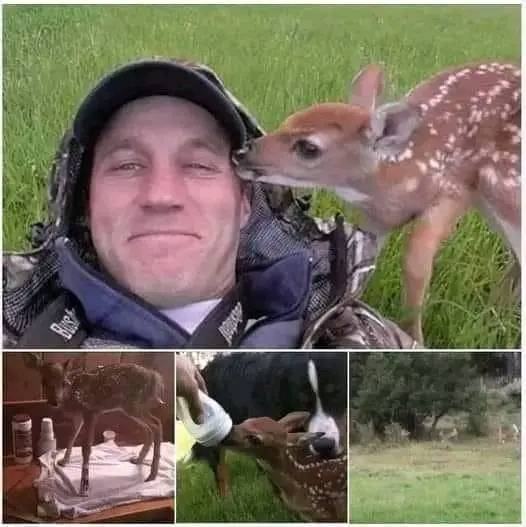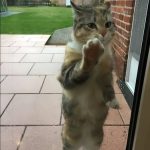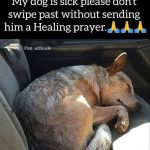The Fawn Who Came Back

A story of kindness, healing, and the wild heart that never forgets.
It began on a quiet morning in the countryside.
As he sipped his coffee, gazing into the lush green of his backyard, something miraculous unfolded before his eyes—a mother deer giving birth to twin fawns. It was a rare, sacred moment, the kind that steals your breath in its stillness.

But joy quickly turned to worry.
One of the newborns struggled to stand. Its leg was twisted and weak. The mother, sensing danger, nudged both fawns frantically. But instinct took over, and when she realized one couldn’t keep up, she did what wild creatures must—she led the healthier twin into the forest, leaving the other behind.

He could have walked away. Told himself it was nature’s way.
But he didn’t.
Instead, he gently approached the trembling fawn, scooped her into his arms, and brought her into his home. There, in a quiet room with blankets and soft light, he made a brace for her leg out of a cereal box and tape—simple, makeshift, but filled with care.
He named her Hope.

Every four hours, he fed her from a bottle. His dogs, sensing she was now part of the pack, took turns licking her face and sleeping beside her, offering warmth and comfort. Slowly, her leg began to heal. She learned to trust. She followed him around the house, rested her head in his lap, and even nibbled on his shoelaces like a curious child.

When she was strong enough, he brought her back to the forest. Again and again, he tried to release her. But every time, she would run after him—limping at first, then gracefully bounding—refusing to be left behind. Her heart had already chosen him.
But he knew. Her story wasn’t meant to end in a fenced yard.
And one day, something extraordinary happened. As he stood watching Hope graze near the edge of the trees, another deer emerged—a mother, cautious but drawn by something she recognized. Hope froze. Sniffed the air. Then slowly, without fear, she walked forward.

It was her mother.
They touched noses. There was no sound, only stillness, and then—like a thread reconnecting to its origin—Hope turned back just once, as if to say thank you, and followed her family into the woods.
He smiled, tears in his eyes. It was never goodbye.
Because now and then, when the breeze is soft and the grass is tall, Hope returns. Not alone, but with her family. And she always pauses by the back fence—where once, a man with a cereal box saved a life.











